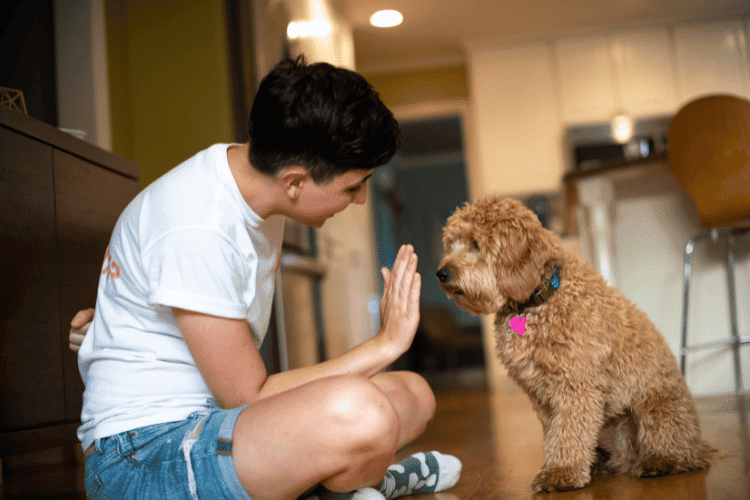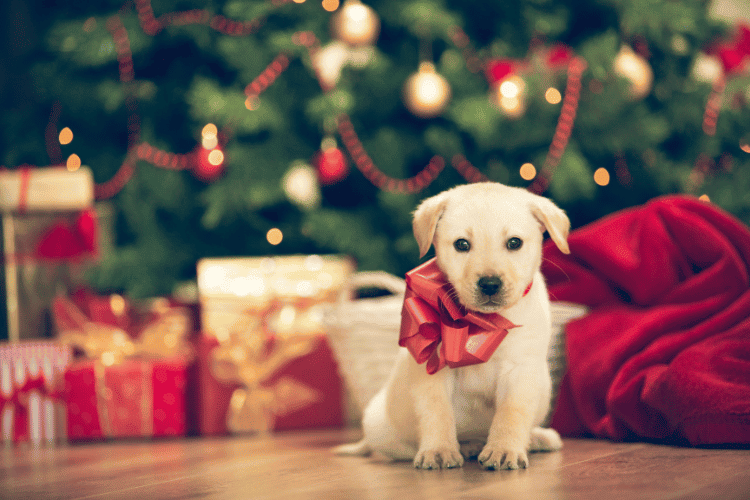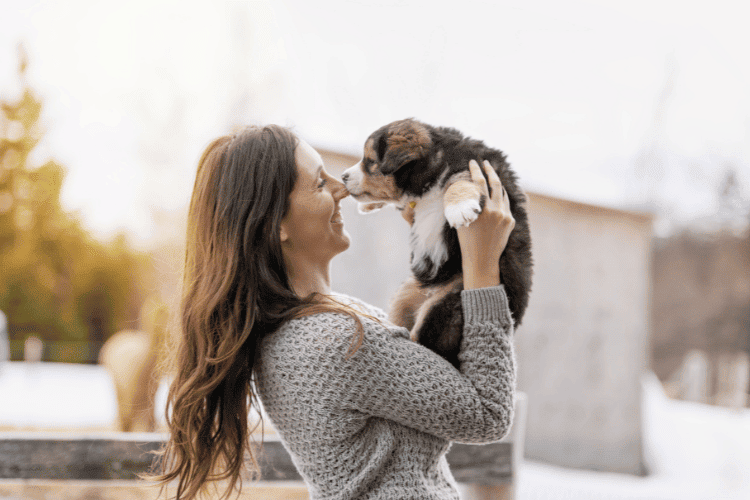Bringing a new puppy into your life is a joyful experience, filled with cuddles, playtime, and the excitement of watching them grow. However, beyond the adorable antics and wagging tails lies a deeper aspect of puppy ownership: building a strong bond. The connection between a pet parent and their furry companion is based on science, psychology, and mutual understanding. In this blog post, we will explore the science behind forging a deep bond with your trained puppy and how it contributes to a harmonious and fulfilling relationship.
Understanding the Canine-Human Bond Development
The bond between humans and dogs is more than just a warm and fuzzy feeling; it’s a biological phenomenon. Studies have shown that when humans interact with dogs, both species experience an oxytocin release. Often referred to as the “love hormone” or “cuddle chemical,” oxytocin plays a crucial role in fostering social connections and emotional attachment.
Building a strong bond with your trained dogs goes beyond spending time together; it involves consistent positive interactions, effective communication, and understanding each other’s needs. This bond doesn’t form overnight; rather, it’s a gradual process that requires patience and effort.
Consistent Routine and Care of Trained Puppy
Dogs thrive on routine and predictability. Establishing a consistent daily routine for feeding, exercise, play, and rest can greatly contribute to your puppy’s sense of security and connection with you. A routine helps your puppy understand what to expect, reducing anxiety and uncertainty.
Additionally, caring for your puppy’s physical and emotional needs is a crucial aspect of bonding. Regular grooming, veterinary care, and ensuring their environment is safe and comfortable show your commitment to their well-being. When your puppy feels safe and cared for, they’re more likely to develop a strong attachment to you.
Quality Time with Your Trained Doggie
Spending quality time with your puppy goes beyond basic care and training sessions. Engage in activities that both of you enjoy, such as going for walks, playing fetch, or exploring new places. These shared experiences create positive associations and memories, enhancing the bond between you and your puppy.
One-on-one time also provides opportunities for mutual learning. You can better understand your puppy’s preferences, fears, and quirks, allowing you to tailor your interactions and training methods accordingly. Likewise, your puppy learns to read your cues and understand your expectations.
Oxytocin’s Role in Human-Dog Relationships
Oxytocin, often termed the “love hormone,” plays a significant role in human-dog relationships. When humans interact with their dogs through activities like petting, playing, or gazing into each other’s eyes, oxytocin is released in both species. This hormone fosters feelings of affection, trust, and attachment, reinforcing the emotional bond between humans and their canine companions. This physiological mechanism sheds light on the depth of the connection that forms, contributing to the mutual love and understanding shared between humans and dogs.
Patience and Relationship-Building with Trained Puppy
Patience is a virtue when it comes to training and building a bond with your puppy. Just like humans, puppies have their own learning pace and personality traits. Avoid punishment-based training methods, as they can damage the trust and connection you’re trying to establish.
Positive reinforcement, on the other hand, involves rewarding desired dog behaviors rather than punishing unwanted ones. This approach encourages your puppy to repeat actions that earn them praise and treats. Over time, they associate your presence with positive outcomes, reinforcing the bond between you two.
Effective Communication with Skilled Puppy
Communication is the foundation of any relationship, and it holds true for the bond between humans and dogs. Likewise, they communicate through body language, barks, and tail wags. Understanding and responding appropriately to your puppy’s signals is essential for building trust and connection.

During training sessions, use positive reinforcement techniques like treats, praise, and affection to reward desired behaviors. This not only helps your puppy learn commands and tricks but also strengthens the bond between you two. When your puppy understands that you’re a source of comfort and reward, they’ll be more inclined to seek your company.
Tips for Maintaining a Lifelong Connection with Your Beloved Pup
Building a strong bond with your trained pup is a journey that doesn’t end once the initial training is complete. Like any relationship, the bond between you and your furry companion requires ongoing effort and nurturing to remain strong.
Proficient Puppy Continued Training and Enrichment
After your puppy has learned the basics, keep their mind engaged by teaching them new tricks or commands. This not only challenges their intellect but also provides opportunities for you to work together and celebrate successes. Enroll in advanced training classes or explore activities like agility training, canine sports, or scent work to keep the learning process exciting for both of you.
Disciplined Canine Regular Exercise and Play
Regular exercise and play are essential components of a healthy and happy canine life. Engaging in physical activities not only keeps dogs physically fit but also helps prevent behavioral issues arising from excess energy. Playtime stimulates mental engagement, fostering problem-solving skills and boosting overall well-being. From a game of fetch to a leisurely stroll, these activities strengthen the bond between pet parents and their furry companions, while also promoting a positive mood and reducing stress for both parties.
Trained Puppy Communication through Body Language
Dogs thrive on new experiences. Take your pup on adventures to different parks, beaches, or pet-friendly places. Exploring new environments stimulates their senses and strengthens their shared memories. Be attentive to your dog’s reactions to new stimuli, ensuring their comfort and enjoyment.
Dogs are experts at reading body language, both from humans and their fellow canines. Maintain open and positive body language when interacting with your puppy. Use consistent cues and gestures during training to make it easier for your pup to understand your expectations. Similarly, pay attention to your dog’s body language to gauge their emotions and needs.
Pups Mindful Grooming and Touch: Trained Puppy
Grooming isn’t just about hygiene; it’s an opportunity for bonding. Regular grooming sessions, such as brushing and nail trimming, can help your puppy associate physical touch with relaxation and care. Use these moments to provide gentle touch, soothing words, and treats to create a positive association.
Just like humans, dogs have distinct personalities. Some might be social butterflies, while others prefer quieter moments. Respect your puppy’s individual preferences and tailor your interactions accordingly. Recognize when your pup needs space or when they’re eager for attention.
Health and Well-Being of Educated Pups
Health and well-being are vital cornerstones of a thriving life for your trained doggy. Regular veterinary check-ups, balanced nutrition, and ample exercise contribute to their physical vitality. Mental well-being is equally essential; engage their minds with puzzles and new experiences. Grooming sessions not only keep them clean but foster relaxation. Adequate sleep completes the equation. A healthy diet, proper care, mental stimulation, and sufficient rest ensure your furry friend enjoys a vibrant life by your side, strengthening the bond you’ve worked hard to build.
Celebrate Your Well-behaved Dog Milestones
Whether it’s their birthday, adoption anniversary, or successful completion of a training goal. These celebrations can be as simple as a special treat, a new toy, or an extra-long playtime session. Acknowledging their achievements strengthens the positive emotions associated with your presence. Remember that your puppy has a voice too, albeit non-verbal. This helps you understand their needs, fears, and desires on a deeper level. By listening and learning from your pup, you foster a sense of mutual understanding and respect.

Conclusion: Trained Puppy
The bond between a schooled pooch and its owner is a beautiful example of interspecies connection. By understanding the science behind this bond and implementing effective communication, consistent care, quality time, patience, and positive reinforcement, you can build a strong and lasting relationship with your furry friend. Remember that the journey of building a bond takes time, but the rewards are immeasurable – a loyal companion who loves and understands you in a way that only a dog can.
FAQs
At what age do puppies typically undergo training?
Puppies typically start training as early as 8 to 12 weeks of age. This is a critical socialization period, and basic commands and behaviors can be introduced during this time. Patience and positive reinforcement are key to setting a strong foundation for their learning and behavior development.
What are the potential negative effects of using punishment-based training methods on the bond with your puppy?
Using punishment-based training methods can erode the bond between you and your puppy. It may lead to fear, anxiety, and mistrust. Puppies associate you with negative experiences, hindering their willingness to engage and learn. Positive reinforcement builds trust and strengthens the bond, ensuring a healthier and more joyful relationship.
How to train a puppy not to bite?
To teach a puppy not to bite, give them good chew toys, guide their biting to toys, and say “good job” when they play gently. Do this a lot so they understand. When they bite less and play nice, you’re doing great!
Want to know the secrets to raising a perfectly behaved, trained pup?
Create a well-balanced routine with consistent commands, positive rewards, and proper socialization. Training is about patience and love, shaping your pup into a joyful, well-mannered companion.


